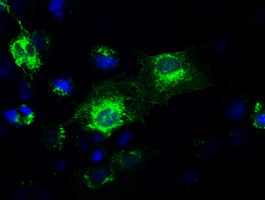GAD67 (GAD1) Mouse Monoclonal Antibody [Clone ID: OTI3H2]
CAT#: TA500328
GAD1 (GAD67) mouse monoclonal antibody, clone OTI3H2 (formerly 3H2)
Size: 30 ul
Formulation: Carrier Free
View other "OTI3H2" antibodies (2)
Special Offer: Get a 15% discount on this product. Use code: “NEURO15".
Specifications
| Product Data | |
| Clone Name | OTI3H2 |
| Applications | IF, IHC, IP, WB |
| Recommended Dilution | WB 1:500-1:1000, IHC 1:50, IF 1:100, IP: 4ug/mL |
| Reactivities | Human, Mouse, Rat, Dog |
| Host | Mouse |
| Isotype | IgG2a |
| Clonality | Monoclonal |
| Immunogen | Full length human recombinant protein of human GAD1 (NP_000808) produced in HEK293T cell. |
| Formulation | PBS (pH 7.3) containing 1% BSA, 50% glycerol and 0.02% sodium azide. |
| Concentration | 0.46 mg/ml |
| Purification | Purified from mouse ascites fluids or tissue culture supernatant by affinity chromatography (protein A/G) |
| Conjugation | Unconjugated |
| Storage | Store at -20°C as received. |
| Stability | Stable for 12 months from date of receipt. |
| Predicted Protein Size | 66.9 kDa |
| Gene Name | glutamate decarboxylase 1 |
| Database Link | |
| Background | This gene encodes one of several forms of glutamic acid decarboxylase, identified as a major autoantigen in insulin-dependent diabetes. The enzyme encoded is responsible for catalyzing the production of gamma-aminobutyric acid from L-glutamic acid. A pathogenic role for this enzyme has been identified in the human pancreas since it has been identified as an autoantigen and an autoreactive T cell target in insulin-dependent diabetes. This gene may also play a role in the stiff man syndrome. Deficiency in this enzyme has been shown to lead to pyridoxine dependency with seizures. Alternative splicing of this gene results in two products, the predominant 67-kD form and a less-frequent 25-kD form. |
| Synonyms | CPSQ1; GAD; SCP |
| Reference Data | |
| Protein Families | Druggable Genome |
| Protein Pathways | Alanine, aspartate and glutamate metabolism, beta-Alanine metabolism, Butanoate metabolism, Metabolic pathways, Taurine and hypotaurine metabolism, Type I diabetes mellitus |
Documents
| Product Manuals |
| FAQs |
| SDS |
Resources
| Antibody Resources |
{0} Product Review(s)
Be the first one to submit a review






























































































































































































































































 Germany
Germany
 Japan
Japan
 United Kingdom
United Kingdom
 China
China












